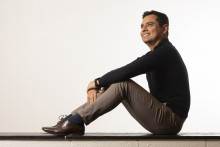‘I came to the Netherlands in 2016 to study a Master’s programme in Psychology. I was looking for a quiet and calm place to fit my lifestyle and focus on my studies. I chose the UT solely because of the programme. I’d never been to the Netherlands before and I had no idea what Enschede was like, but from the start I came here with the plan to stay long-term.
Roberto Cruz Martinez
PhD research topic: eHealth technologies aiming to support the self-management behaviours of patients with chronic diseases
Work: Information Specialist & Open-Access Specialist at LISA (Library, ICT-Services & Archive) & PhD candidate at Department of Psychology, Health & Technology (BMS Faculty)
Education: Master degree in Sports Psychology (Universidad Autónoma de Nuevo León, Mexico) & MSc Psychology (University of Twente)
Originally from: Mexico
The choice to study psychology was always clear to me. I never doubted it. It was the only option. I’ve always been very interested in humans, in what drives us, how we think. I’ve become really passionate about the topic, but I didn’t want to become a therapist. I had an early interest in social psychology – in what impacts us as a community. I guess that also explains my former activities as a board member of P-NUT (PhD Network of the University of Twente) and now as a member of the University Council. I like reaching out to people.
'I like reaching out to people'
I’ve always been very proactive and vocal. Since September 2022, I’m a member of the University Council. I enjoy activism very much. Maybe too much. I know that individuals can make a big difference – for themselves, but also for others. That is my passion and it’s a principle at this point. I want my life’s work to be more than just whatever job I have at the moment. I want to participate and actively work toward changing things. Hopefully that also motivates others to become involved. As I’m getting older and getting more experience, I feel that I should try and help wherever I can. After all, it will be up to my generation to be in charge soon.’

‘My PhD research is about self-regulation, also known as self-management or self-care when it comes to health regulation. This generally refers to what a person can consciously do to plan their life based on their goals, what cognitive functions or specific behaviours are involved and so on. I focus on how individuals with chronic conditions can take better care of themselves. This covers, for example, patients with heart failure or those recovering from a stroke. And because we are the UT, I research possible interventions with digital technologies. I’m looking into how we can design and use technologies to motivate people and facilitate changes in their lifestyle.
My doctoral research was possible thanks to a scholarship from the Mexican National Council for Science and Technology, but this scholarship ran out in 2021. I needed an extension to continue my research, and so I also started searching for jobs. Luckily enough, I could apply for my current position as an Information Specialist, which is now my fulltime job at the UT. I’m still busy writing my PhD dissertation and I’m still very passionate about it, but I haven’t been able to give it much attention lately. I need to engage more. It’s become a behavioural problem – and I’m an expert on that, so I know how that goes. The pattern needs to be broken. Everyone has been very supportive and understanding of my situation. It's all up to me now.’
‘I’m very happy that I embarked on the PhD journey, though. It has exceeded my expectations. It might sound like a cliché, but the best part has been the community. I never could have imagined all the different people I’d meet. There are some bad parts, of course. Although I’m usually very positive, there were a few moments when I had to be critical. Being a PhD on a scholarship has its disadvantages. On top of doing research, I had to be busy with a lot of extra things. Around the middle of my PhD I even had to prove to the Dutch government that I had sufficient financial means to stay here, because the scholarship wasn’t enough. Recently, I had serious troubles with housing. Often I felt like I was in a gap, like I didn’t have enough rights. At one point, I was even considering to leave. When a lot of small things accumulate, it just gets to you. But that’s all in the past now.
'There were a few moments when I had to be critical'
I see myself staying at the UT. I’m really happy with my job and I see many areas where I can contribute, such as Open Access. I’m passionate about science and how it can improve – and I want to be able to influence that.’








